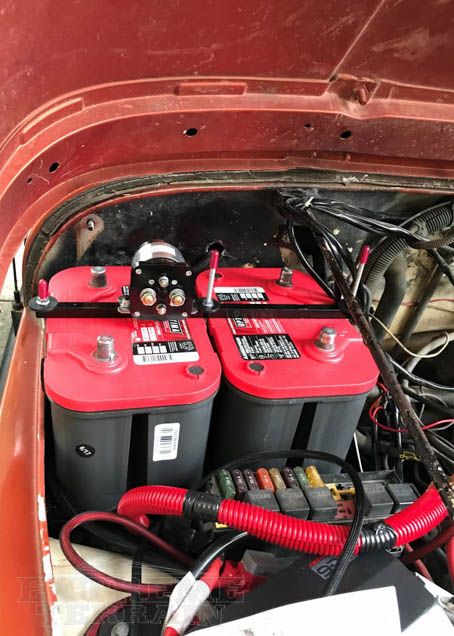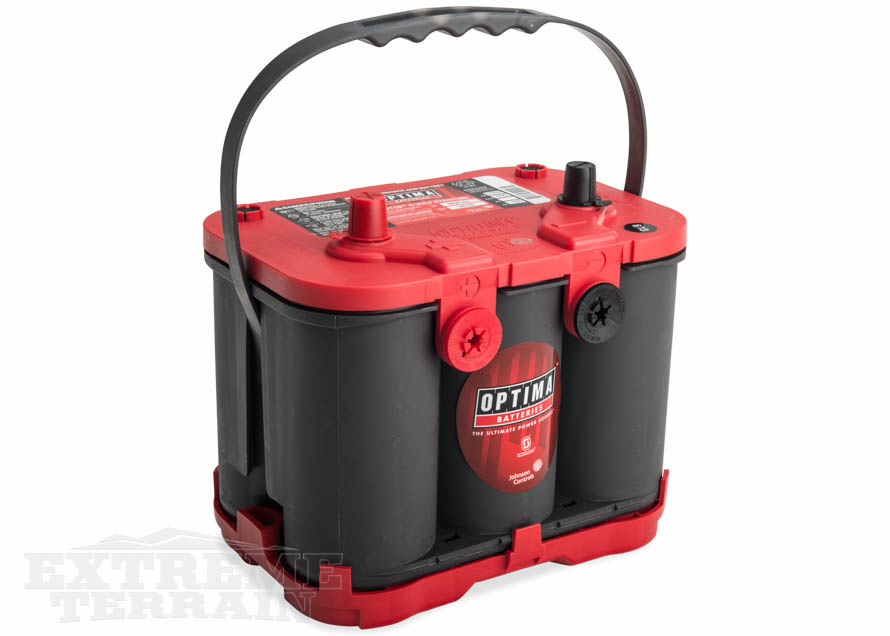Deep-Cycle Battery vs. SLI Battery
You may be deciding between a standard SLI battery (eg. start, light, and ignition) or investing in a dual-purpose, deep-cycle battery for your Jeep. Standard ignition batteries are designed to start your engine by delivering a large pulse of energy upon ignition. Standard starter batteries discharge around 3% of its total capacity upon startup and are recharged by the alternator during vehicle operation.
SLI batteries are not designed for deep cycling (discharging below 50% of its max capacity) or else you risk dissolving the lead sponges found in its solution. SLI batteries are typically at risk of failing after 30-deep cycle states or after full discharge of its capacity. Due to this, starter batteries require more maintenance and often have shorter lifespans.
On the other hand, deep-cycle batteries are designed with thicker, solid plates that allow it to recharge after discharging up to 98% of its maximum capacity. Deep cycle batteries typically don't have the starting power that starting batteries do and characteristically have a lower CCA (cold crank amperage). For a more powerful deep-cycle CCA, you will require a larger or dual purpose deep-cycle battery.
Deep cycle batteries have two taxonomies:
- Flooded (FLA)
- Valve Regulated Lead Acid (VRLA)
VRLA batteries are typically comprised of either gel mat batteries or AGM (Absorbed Glass Mat) batteries, which we mentioned previously.
What is an AGM Battery?
AGM batteries are designed differently from conventional batteries. AGM batteries are designed with a thin fiberglass mat that is compressed and soldered in between two plates and flooded with battery acid up to 95% of what it can hold. Due to this design, AGM batteries typically have no vibration and reduced self-discharge, significantly increasing its battery life. AGM batteries are also designed for a spill-proof system, as opposed to standard lead acid batteries.
You’ll find many brands that manufacture AGM batteries for Jeep Wranglers. AGM batteries afford many benefits, including:
- No maintenance required
- Reduced vibration
- Spill-proof terminal system
- Significantly longer battery life
- Lowest self-discharge of battery types
- Reduced internal resistance
- Reduced water loss
- Reduced hydrogen emissions
Internal resistance is important in batteries because internal resistance forms heat, which can lead to multiple problems for your battery. Mainly, internal resistance leads to a drop in voltage across terminals.
An important distinction must also be made. AGM batteries are not gel batteries, nor are they necessarily deep-cycle. Brands, such as Optima have specially designed AGM batteries that operate as a SLI battery. AGM batteries designed for standard ignition are also susceptible to thermal runaway and self-discharge or loss of battery capacity.
Dual Battery Systems: Pros and Cons
Many Jeep Wrangler owners take advantage of a deep-cycle backup battery to power applications and lights during their off-roading adventures. While a dual purpose deep-cycle battery may fit your needs, it also needs to fit the specifications of your Jeep Wrangler. One idea many consumers have is of actually placing two batteries inside their wrangler (an SLI and a deep cycle). There are even steel dual battery trays designed to hold two batteries, or a winch.
Essentially, in a dual battery system, both batteries are connected to an isolator. The isolator opens during motor operation and feeds both batteries upon discharge through the alternator. Upon turning the engine off, the isolator will continue to feed the second battery (deep-cycle) and prevent the SLI battery from discharge.
Pros:
- Power applications without using the starter battery
- Provides necessary crank power derived from starter battery
- Charges your second battery
- Aids in self-recovery situations
Cons:
- More expensive (2 batteries isolator) and professional installation is recommended
- Dual batteries may not fit under the hood and may need to be wired from the trunk
- Power is only distributed to applications that immediately plug into your vehicle
A high-power alternator could also provide additional capacity to a standard battery without investing in a second battery. It’s important to realize that having dual battery systems does not affect engine performance during vehicle operation nor does it provide you with any extra power. Jeep enthusiasts also have the option of choosing from performance batteries that offer both deep-cycling and high pulse amperage.

Dual Battery Tray
Jeep Wrangler Battery: Specs
Cold Crank: Depending where you drive, your vehicle may require a higher CCA rating for colder conditions. Cold crank amperage refers to the amount of amperes a 12-volt battery could deliver over 30 seconds at 32 degrees Fahrenheit while maintaining at least 7.2 volts. To put it in simpler terms, a battery’s CCA rating determines the amount of power it can deliver at startup. For those Jeep owners looking to climb the Rocky Mountains this winter, it pays to have a battery with a high CCA.
Reserve Capacity: Reserve capacity is defined as the amount of minutes a battery can maintain 25 amps at 80 degrees Fahrenheit, after an alternator fails, without falling below 12 volts. Amp hour is simply defined as the amount of capacity a new battery holds. Reserve capacity is not a major concern for choosing a battery and it pays more to know about the characteristics of the battery itself, such as deep cycle vs. SLI, self-discharge rates, and susceptibility to corrosion and water loss.

Performance CCA Battery
What’s a Battery’s Role in Self-Recovery Operations?
For those aggressive off-roaders, it’s ideal to carry an electrical winch kit that can help your Wrangler recover when it’s stuck in rough terrain. An electrical winch battery is powered directly from your Wrangler’s battery, which is fed power from the alternator. For this reason, it’s ideal to leave your Jeep running during winching operation, so you don’t blow out your reserve capacity. Of course, if your engine floods or shuts down this is not always an option.
A deep-cycle, dual battery setup resembles the most reliable self-recovery kit available. Deep-cycle batteries are designed to hold enough reserve capacity to power an electrical winching operation. Upgrade to a deep-cycle battery with a ton of cranking power so you can still power your Jeep on after a deep-cycle operation.
Jeep Wrangler: Choosing the Right Battery
We offer Jeep Wrangler batteries for all recent generations, including JK, TJ, and YJ. Finding the right battery depends on the temperature of your climate, the size of the battery, and the amount of additional applications you need to power during operation, such as fog or power lights.
Brands like Optima utilize its own proprietary SprialCell technology that delivers a high-CCA startup and deep cycling capabilities. NorthStar also manufactures high CCA batteries with an insanely fast recharge rate. Every battery is designed to deliver quick, effortless startup while using heat resistant technology and spill-proof design to enhance battery life far beyond conventional batteries. Find the battery that will power your Wrangler lifestyle.
Fitment Includes:
- 1976, 1977, 1978, 1979, 1980, 1981, 1982, 1983, 1984, 1985, 1986, 1987, 1988, 1989, 1990, 1991, 1992, 1993, 1994, 1995, 1997, 1998, 1999, 2000, 2001, 2002, 2003, 2004, 2005, 2006, 2007, 2008, 2009, 2010, 2011, 2012, 2013, 2014, 2015, 2016, 2017, 2018, 2019, 2020, 2021, 2022, 2023 and 2024 Jeep Wranglers
- Rubicon, Sahara, Sport S, Sport, Unlimited, Islander, Rocky Mountain, Renegade Wranglers
*Please see product pages for any exceptions.







